Agnosticism is the view that the existence of God, of the divine or the supernatural is unknown or unknowable. Another definition provided is the view that "human reason is incapable of providing sufficient rational grounds to justify either the belief that God exists or the belief that God does not exist."
Ambrose of Milan, venerated as Saint Ambrose, was the Bishop of Milan, a theologian, and one of the most influential ecclesiastical figures of the 4th century.

Augustine of Hippo, also known as Saint Augustine, was a theologian, philosopher, and the bishop of Hippo Regius in Numidia, Roman North Africa. His writings influenced the development of Western philosophy and Western Christianity, and he is viewed as one of the most important Church Fathers of the Latin Church in the Patristic Period. His many important works include The City of God, On Christian Doctrine, and Confessions.

Cogito, ergo sum is a philosophical statement that was made in Latin by René Descartes, usually translated into English as "I think, therefore I am". The phrase originally appeared in French as je pense, donc je suis in his Discourse on the Method, so as to reach a wider audience than Latin would have allowed. It appeared in Latin in his later Principles of Philosophy. As Descartes explained it, "we cannot doubt of our existence while we doubt." A fuller version, articulated by Antoine Léonard Thomas, aptly captures Descartes's intent: dubito, ergo cogito, ergo sum. The dictum is also sometimes referred to as the cogito.
Pelagianism is a heterodox Christian theological position which holds that the original sin did not taint human nature and that humans have the free will to achieve human perfection without divine grace. Pelagius, a British ascetic and philosopher, taught that God could not command believers to do the impossible, and therefore it must be possible to satisfy all divine commandments. He also taught that it was unjust to punish one person for the sins of another; therefore, infants are born blameless. Pelagius accepted no excuse for sinful behavior and taught that all Christians, regardless of their station in life, should live unimpeachable, sinless lives.

René Descartes was a French-born philosopher, mathematician, and scientist who spent a large portion of his working life in the Dutch Republic, initially serving the Dutch States Army of Maurice of Nassau, Prince of Orange and the Stadtholder of the United Provinces. One of the most notable intellectual figures of the Dutch Golden Age, Descartes is also widely regarded as one of the founders of modern philosophy.
The problem of evil is the question of how to reconcile the existence of evil and suffering with an omnipotent, omnibenevolent, and omniscient God. The best known presentation of the problem is attributed to the Greek philosopher Epicurus which was popularized by David Hume. Responses to the problem have traditionally been discussed under the heading of theodicy. Besides philosophy of religion, the problem of evil is also important to the fields of theology and ethics.
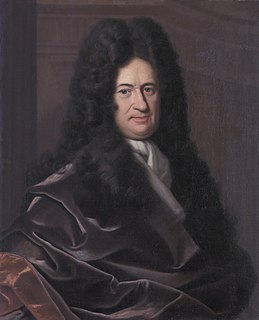
Theodicy means vindication of God. It is to answer the question of why a good God permits the manifestation of evil, thus resolving the issue of the problem of evil. Some theodicies also address the evidential problem of evil by attempting "to make the existence of an all-knowing, all-powerful and all-good or omnibenevolent God consistent with the existence of evil or suffering in the world." Unlike a defense, which tries to demonstrate that God's existence is logically possible in the light of evil, a theodicy attempts to provide a framework wherein God's existence is also plausible. The German philosopher and mathematician Gottfried Leibniz coined the term "theodicy" in 1710 in his work Théodicée, though various responses to the problem of evil had been previously proposed. The British philosopher John Hick traced the history of moral theodicy in his 1966 work, Evil and the God of Love, identifying three major traditions:
- the Plotinian theodicy, named after Plotinus
- the Augustinian theodicy, which Hick based on the writings of Augustine of Hippo
- the Irenaean theodicy, which Hick developed, based on the thinking of St. Irenaeus

Pelagius was a theologian who advocated free will and asceticism. He was accused by Augustine of Hippo and others of denying the need for divine aid in performing good works. They understood him to have said that the only grace necessary was the declaration of the law; humans were not wounded by Adam's sin and were perfectly able to fulfill the law without divine aid. Pelagius denied Augustine's theory of original sin. Adherents of Pelagius cited Deuteronomy 24:16 in support of their position. Pelagius was declared a heretic by the Council of Ephesus in 431. His interpretation of a doctrine of free will became known as Pelagianism.
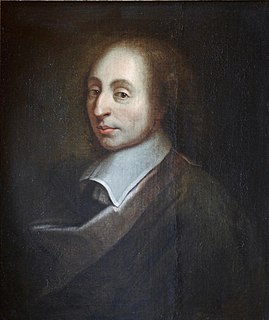
Pascal's wager is an argument in philosophy presented by the seventeenth-century French philosopher, theologian, mathematician and physicist, Blaise Pascal (1623–1662). It posits that human beings bet with their lives that God either exists or does not.
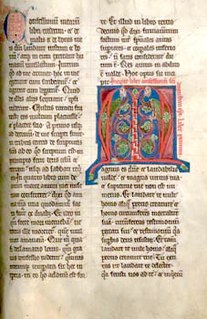
Confessions is an autobiographical work by Saint Augustine of Hippo, consisting of 13 books written in Latin between AD 397 and 400. The work outlines Saint Augustine's sinful youth and his conversion to Christianity. Modern English translations of it are sometimes published under the title The Confessions of Saint Augustine in order to distinguish the book from other books with similar titles. Its original title was Confessions in Thirteen Books, and it was composed to be read out loud with each book being a complete unit.

Nicholas Paul Wolterstorff is an American philosopher and theologian. He is currently Noah Porter Professor Emeritus Philosophical Theology at Yale University. A prolific writer with wide-ranging philosophical and theological interests, he has written books on aesthetics, epistemology, political philosophy, philosophy of religion, metaphysics, and philosophy of education. In Faith and Rationality, Wolterstorff, Alvin Plantinga, and William Alston developed and expanded upon a view of religious epistemology that has come to be known as Reformed epistemology. He also helped to establish the journal Faith and Philosophy and the Society of Christian Philosophers.
In philosophy, transcendence is the basic ground concept from the word's literal meaning, of climbing or going beyond, albeit with varying connotations in its different historical and cultural stages. It includes philosophies, systems, and approaches that describe the fundamental structures of being, not as an ontology, but as the framework of emergence and validation of knowledge of being. "Transcendental" is a word derived from the scholastic, designating the extra-categorical attributes of beings.
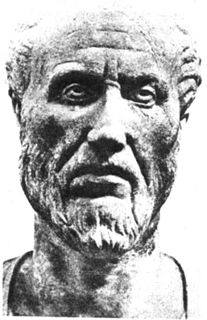
Neoplatonism was a major influence on Christian theology throughout Late Antiquity and the Middle Ages in the West. This was due to St. Augustine of Hippo, who was influenced by the early neoplatonists Plotinus and Porphyry, as well as the works of the Christian writer Pseudo-Dionysius the Areopagite, who was influenced by later neoplatonists, such as Proclus and Damascius.
James Vincent Schall was an American Jesuit Roman Catholic priest, teacher, writer, and philosopher. He was, most recently, Professor of Political Philosophy in the Department of Government at Georgetown University. He retired from teaching in December 2012, giving his final lecture on December 7, 2012, at Georgetown; it was entitled "The Final Gladness," and was sponsored by the Tocqueville Forum. Of his many publications his book Another Sort of Learning has been hailed as exceptional.
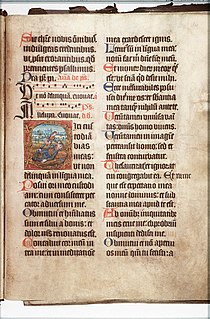
Psalm 39 is the 39th psalm of the Book of Psalms, beginning in English in the King James Version: "I said, I will take heed to my ways, that I sin not with my tongue". The Book of Psalms is part of the third section of the Hebrew Bible, and a book of the Christian Old Testament. In the slightly different numbering system in the Greek Septuagint version of the Bible, and in its Latin translation, the Vulgate, this psalm is Psalm 38. In Latin, it is known as "Dixi custodiam vias meas". It is a meditation on the fragility of man before God, ending in a prayer for a peaceful life.
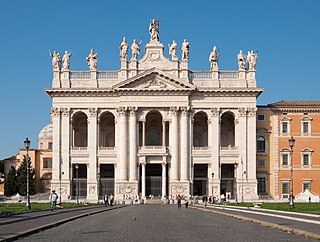
The Latin Church, also known as the Roman Catholic Church or the Western Church is the largest particular church sui iuris of the Catholic Church, and employs the Latin liturgical rites. It is one of 24 such churches, the 23 others forming the Eastern Catholic Churches. It is headed by the bishop of Rome, the pope – traditionally also called the patriarch of the West – with his cathedra in this role at the Archbasilica of Saint John Lateran in Rome, Italy. The Latin Church traces its history to the earliest days of Christianity through its direct leadership under the Holy See that according to Catholic tradition was founded by Peter and Paul.
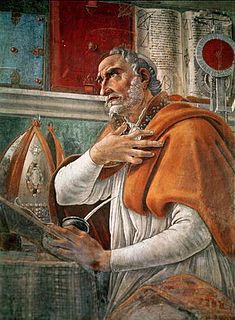
The Augustinian theodicy, named for the 4th- and 5th-century theologian and philosopher Augustine of Hippo, is a type of Christian theodicy designed in response to the evidential problem of evil. As such, it attempts to explain the probability of an omnipotent (all-powerful) and omnibenevolent (all-good) God amid evidence of evil in the world. A number of variations of this kind of theodicy have been proposed throughout history; their similarities were first described by the 20th-century philosopher John Hick, who classified them as "Augustinian". They typically assert that God is perfectly (ideally) good, that he created the world out of nothing, and that evil is the result of humanity's original sin. The entry of evil into the world is generally explained as consequence of original sin and its continued presence due to humans' misuse of free will and concupiscence. God's goodness and benevolence, according to the Augustinian theodicy, remain perfect and without responsibility for evil or suffering.

Seeing with the Eyes of Love by Eknath Easwaran is a practical commentary on The Imitation of Christ, a Christian devotional classic of the early 15th century, believed to be the work of Thomas à Kempis. Easwaran's commentary emphasizes how to translate the Imitation into daily living with the aid of spiritual practices. Seeing with the Eyes of Love was originally published in the United States in 1991. A German translation was published in 1993, and a second U.S. edition was published in 1996. The book has been reviewed in newspapers, magazines, and websites.
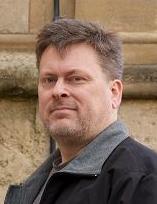
Edward C. Feser is an American philosopher. He is Associate Professor of Philosophy at Pasadena City College in Pasadena, California.













